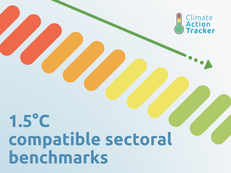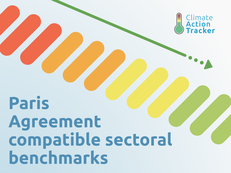Publications (EU)
Decarbonising road transport: light-duty vehicles
The broad strokes of a Paris Agreement-aligned roadmap are clear: we need to roughly halve emissions by 2030, achieve net zero CO2 emissions by 2050 and net zero greenhouse gas emissions soon after. However, the details at the national and sectoral level are often still unclear. In this report, the read more...
Pulling the plug on fossils in power
Decarbonising the power sector is a key step on the road to net zero as it will cut both power sector emissions and help push fossil fuels out of the buildings, transport and industrial sectors as these sectors electrify.To help track global and country level progress, the Climate Action Tracker read more...
Paris-aligned benchmarks for the power sector
As the world moves to address the climate crisis and journey towards a zero-carbon future, roadmaps which demonstrate the pathway to cut emissions fast, fairly and effectively are essential.The broad strokes of a Paris-aligned roadmap are clear – we need to roughly halve emissions by 2030, achieve net zero CO2 read more...
Global update: Paris Agreement Turning Point
The recent wave of net zero targets has put the Paris Agreement’s 1.5°C within striking distance. The Climate Action Tracker (CAT) has calculated that global warming by 2100 could be as low as 2.1°C as a result of all the net zero pledges announced as of November 2020. Included in read more...
Global update: Pandemic recovery with just a hint of green
In this briefing, we examine the COVID-19 recovery packages of five major emitters – China, EU27, India, South Korea and the USA; we present the global temperature update, taking into account the economic impact of COVID-19; and we share key insights from the updated assessments for 13 of the 36 read more...
Paris Agreement Compatible Sectoral Benchmarks
We updated our power sector benchmarks in 2023. The report is available here. While national emission trends are a useful tool for measuring government progress towards meeting the Paris Agreement 1.5˚C temperature limit at a global level, each government will have to address its own sectors, each with their own, read more...
A government roadmap for addressing the climate and post COVID-19 economic crises
The COVID-19 pandemic presents the world with an unprecedented policy challenge: not only will it have a severe impact on the global economy likely to exceed that of both the 2008-09 Global Financial Crisis and the Great Depression, it will take place against the backdrop of the ongoing climate crisis.In read more...
Governments still showing little sign of acting on climate crisis
Under current pledges, the world will warm by 2.8°C by the end of the century, close to twice the limit they agreed in Paris. Governments are even further from the Paris temperature limit in terms of their real-world action, which would see the temperature rise by 3°C. An ‘optimistic’ take read more...
Climate crisis demands more government action as emissions rise
The last year has seen growing public concern and the formation of global movements pushing governments for serious action in the face of rising emissions and escalating climate impacts.2018 saw energy-related emissions reach yet another historic high after significant net greenhouse gas increases, 85% of which came from the US, read more...
Analysis: Transformation points - Achieving the speed and scale required for full decarbonisation
Staying within the Paris Agreement 1.5˚C temperature limit requires rapid, large-scale systemic transformations to fully decarbonise the global energy system by 2050.Transformations of the speed and scale required have occurred historically when systems reached a transformation point: the moment when a previously novel technology, behaviour or market model achieved critical read more...
Stay informed
Subscribe to our newsletter







